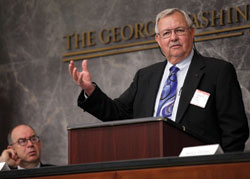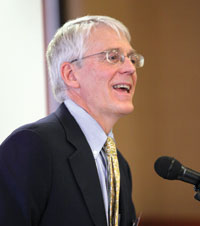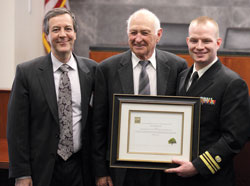The Clean Water Act at 40
Shapiro Environmental Law Symposium Addresses Clean Water Issues

William Hines, dean emeritus and Joseph F. Rosenfield Distinguished Professor of Law at the University of Iowa College of Law, gave an insightful history of the Clean Water Act.
Abdul El-Tayef
This year marks the 40th anniversary of the passage of the Clean Water Act (CWA) amendments, the landmark legislation to "restore and maintain the chemical, physical, and biological integrity of the nation's waters."
GW Law recognized this milestone in environmental protection at the J.B. and Maurice C. Shapiro Environmental Law Symposium. The conference, titled "The Clean Water Act at 40," brought together many of the nation's top CWA experts from academia, government, and the private sector to reflect on the environmental field's accomplishments and discuss the future of water pollution control in the United States.
The first day of the conference, coinciding with the United Nations' World Water Day, featured distinguished speakers from across the nation. In her keynote speech, Nancy Stoner, acting associate administrator for water at the U.S. Environmental Protection Agency (EPA), focused on the EPA's theme, Water is worth it.
William Hines, dean emeritus and Joseph F. Rosenfield Distinguished Professor of Law at the University of Iowa College of Law, gave an insightful history of the Clean Water Act, including little-known facts about events surrounding the passage of the 1972 Federal Water Pollution Control Act Amendments.

Natural Resources Defense Council Executive Director Peter Lehner provided the luncheon keynote address.
Abdul El-Tayef
Other speakers addressed a variety of clean water issues, including the need for increased green infrastructure to aid in storm water control, such as green roofs, pervious pavements, and household rainwater collection, as well as the need for cities to rethink how they manage and meet water needs.
The Environmental and Energy Law Program's annual spring conference was made possible by a generous endowment from the J.B. and Maurice C. Shapiro Charitable Trust. The 2012 conference was co-sponsored by the George Washington University Law School, the Environmental Law Institute, the Center for Progressive Reform, the Association of Clean Water Administrators, the Clean Water America Alliance, the George Washington Journal of Energy and Environmental Law, and the GW Environmental Law Association.
Click here to view video of the conference.
Environmental Law Program Now on Twitter
Associate Dean for Environmental Law Studies Lee Paddock has launched a Twitter page and will be posting regularly about the GW Environmental and Energy Law Program.
His first assignment was reporting from the joint George Washington University-University of Surrey conference, Regulatory and Institutional Frameworks for Markets for Ecosystem Services, held at the University of Surrey in England on June 6-7.
Later in June, live from Brazil, Dean Paddock tweeted from the Rio+20—the United Nations Conference on Sustainable Development. Rio+20 marks the 20th anniversary of the 1992 United Nations Conference on Environment and Development and the 10th anniversary of the 2002 World Summit on Sustainable Development. The conference brought together governments, international institutions, and organizations on a range of smart measures that can reduce poverty while promoting decent jobs, clean energy, and a more sustainable and fair use of resources.
Follow Dean Paddock and the Environmental and Energy Law Program on Twitter.
Jonathan Dowling Wins 2012 Jamie Grodsky Prize

Professor Robert Glicksman and Dr. Gerold Grodsky present Lieutenant Commander Jonathan Dowling, LLM '11, with the 2012 Jamie Grodsky Prize.
Abdul El-Tayef
At the Shapiro Environmental Conference, the George Washington University Law School awarded Lieutenant Commander Jonathan Dowling, JAGC, USN, LLM '11, with the 2012 Jamie Grodsky Prize for Environmental Law Scholarship.
Lieutenant Commander Dowling's paper, "Improving Energy Security with the Great Green Fleet: The Case for Transitioning from Ethanol to Drop-In Renewable Fuels," highlights the U.S. Navy's planned Great Green Fleet, a strike group that will be composed of nuclear- powered carriers and submarines, hybrid electric ships powered by a 50/50 blend of algae-based naval propulsion fuel, and aircraft flying on a 50/50 blend of camelina-based naval aviation fuel. The fleet is a major emblem of the Navy's larger initiative to meet half of its energy requirements through renewable sources by 2020.
In his paper, he uses the Navy's example to urge the U.S. Congress to adopt a similar initiative, forgoing legislative preferences for ethanol-based fuels in favor of "drop-in" renewable fuels that meet the same performance capabilities of petroleum-based fuel. The paper concludes with recommendations for fostering a new renewable fuel policy that provides the United States with the greatest amount of energy security in a cost-effective and market-oriented manner.
Lieutenant Commander Dowling accepted a commission in the United States Navy Judge Advocate General's Corps in 2003 at the end of his second year of law school. During his first tour, he served as a legal assistance attorney, region tax officer, and defense counsel at Naval Legal Service Office Southwest in San Diego. In 2006, he deployed to Iraq as a legal adviser for the Joint Interrogation and Debriefing Center.
For his second tour, he served as a defense counsel and eventually as the senior defense counsel at Naval Legal Service Office Europe, Africa, and Southwest Asia in Naples, Italy. His casework took him all over Western Europe and the Middle East, including Iraq and Afghanistan, where he represented sailors facing administrative separation and court-martial. Currently, he serves as an environmental attorney for Chief of Naval Operations, N4 - Fleet Readiness and Logistics.
The Jamie Grodsky Prize for Environmental Law Scholarship is awarded each year at a ceremony held in connection with the J.B. and Maurice C. Shapiro Environmental Law Conference. The prize of $5,000 is awarded for the best paper written by a GW Law JD, LLM, or SJD student in the field of environmental law, based on originality, innovation, depth of scholarship, the importance of the environmental issue addressed, and the quality of the writing and analysis.
Now in its second year, the Grodsky Prize was established to honor the late Professor Grodsky's legacy of leading-edge environmental scholarship by encouraging students to produce papers on important environmental issues. The prize is made possible by a generous gift from Dr. Gerold Grodsky.



